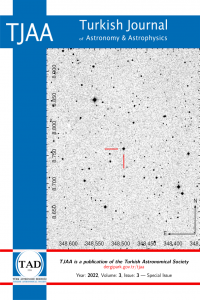Abstract
This study presents the first spectroscopic observations of four quasar candidates. We select the quasar candidates considering the high candidacy probabilities calculated from the SDSS and WISE photometric colors. We obtained the long-slit spectrum of each candidate with RTT-150 telescope and TFOSC spectrometer in two nights of January and February 2021. The reduced spectra shows both broad and narrow emission features confirming that all four of the candidates are members of quasar class. We present the calculation results of $z$, $d_L$, and $M_i(z=2)$ parameters for four quasars.
References
- Bovy, J., et al., (2011). Think outside the color box: Probabilistic target selection and the SDSS-XDQSO Quasar targeting catalog. The Astrophysical Journal, 729 (2), 141.
- Hazard, C., Mackey, M. B., & Shimmins, A. J. (1963). Investigation of the Radio Source 3 C 273 By The Method of Lunar Occultations. Nature, 197 (4872), 1037-1039.
- Heintz, K. E., et al., (2020). Spectroscopic classification of a complete sample of astrometrically-selected quasar candidates using Gaia DR2. Astronomy & Astrophysics, 644, A17.
- Kacan E. S., Hökelek S., Filiz Ak N., 2021, Turkish J of AA, yayına hazırlanıyor.
- Lyke, B. W., et al., (2020). The Sloan Digital Sky Survey Quasar Catalog: Sixteenth Data Release. The Astrophysical Journal Supplement Series, 250 (1), 8.
- Mushotzky, R. (2004). How are AGN Found?. In Supermassive Black Holes in the Distant Universe (pp. 53-87). Springer, Dordrecht.
- Peterson, B. M. (1997). An introduction to active galactic nuclei. Cambridge University Press.
- Richards, G. T., et al., (2002). Spectroscopic target selection in the sloan digital sky survey: The quasar sample. The Astronomical Journal, 123 (6), 2945.
- Richards, G. T., et al., (2006). The sloan digital sky survey quasar survey: Quasar luminosity function from data release 3. The Astronomical Journal, 131 (6), 2766.
- Richards, G. T., et al., (2009). Efficient photometric selection of quasars from the Sloan Digital Sky Survey. II.∼ 1, 000, 000 quasars from Data Release 6. The Astrophysical Journal Supplement Series, 180 (1), 67.
- Schlafly, E. F., & Finkbeiner, D. P. (2011). Measuring reddening with Sloan Digital Sky Survey stellar spectra and recalibrating SFD. The Astrophysical Journal, 737(2), 103.
- Schmidt, M. (1963). 3 C 273: a star-like object with large red-shift. Nature, 197 (4872), 1040-1040.
- Share, G. (1996). VizieR Online Data Catalog: Kitt Peak Quasar List (Share, 1975). VizieR Online Data Catalog, VII-11.
- Skrutskie, M. F., et al., (2006). The two micron all sky survey (2MASS). The Astronomical Journal, 131 (2), 1163.
- Vanden Berk D. E., et al., (2001). Composite quasar spectra from the sloan digital sky survey. The Astronomical Journal, 122 (2), 549.
- Wright E. L., et al., (2010). The Wide-field Infrared Survey Explorer (WISE): mission description and initial on-orbit performance. The Astronomical Journal, 140(6), 1868.
Abstract
Bu çalışma; dört kuazar adayının ilk spektroskopik gözlemlerini sunmaktadır. SDSS ve WISE fotometrik renklerinden hesaplanan yüksek adaylık olasılıklarını göz önünde bulundurarak kuazar adaylarını seçiyoruz. RTT150 teleskobu ve TFOSC tayfçekeri ile elde edilmiştir. Ocak ve Şubat 2021'de toplam 2 gece yapılan gözlemlerle ilk kez uzun-yarık tayfsal verileri elde edilmiştir. Bu verilerin indirgenmesi sonucunda elde ettiğimiz ön sonuçlar, keşfedilen dört kuazarın tayfında geniş ve dar salma çizgilerinin varlığı doğrulanmıştır. Bu dört kuazara ait $z$, $d_L$ ve $M_i(z=2)$ parametreleri hesaplanmıştır.
References
- Bovy, J., et al., (2011). Think outside the color box: Probabilistic target selection and the SDSS-XDQSO Quasar targeting catalog. The Astrophysical Journal, 729 (2), 141.
- Hazard, C., Mackey, M. B., & Shimmins, A. J. (1963). Investigation of the Radio Source 3 C 273 By The Method of Lunar Occultations. Nature, 197 (4872), 1037-1039.
- Heintz, K. E., et al., (2020). Spectroscopic classification of a complete sample of astrometrically-selected quasar candidates using Gaia DR2. Astronomy & Astrophysics, 644, A17.
- Kacan E. S., Hökelek S., Filiz Ak N., 2021, Turkish J of AA, yayına hazırlanıyor.
- Lyke, B. W., et al., (2020). The Sloan Digital Sky Survey Quasar Catalog: Sixteenth Data Release. The Astrophysical Journal Supplement Series, 250 (1), 8.
- Mushotzky, R. (2004). How are AGN Found?. In Supermassive Black Holes in the Distant Universe (pp. 53-87). Springer, Dordrecht.
- Peterson, B. M. (1997). An introduction to active galactic nuclei. Cambridge University Press.
- Richards, G. T., et al., (2002). Spectroscopic target selection in the sloan digital sky survey: The quasar sample. The Astronomical Journal, 123 (6), 2945.
- Richards, G. T., et al., (2006). The sloan digital sky survey quasar survey: Quasar luminosity function from data release 3. The Astronomical Journal, 131 (6), 2766.
- Richards, G. T., et al., (2009). Efficient photometric selection of quasars from the Sloan Digital Sky Survey. II.∼ 1, 000, 000 quasars from Data Release 6. The Astrophysical Journal Supplement Series, 180 (1), 67.
- Schlafly, E. F., & Finkbeiner, D. P. (2011). Measuring reddening with Sloan Digital Sky Survey stellar spectra and recalibrating SFD. The Astrophysical Journal, 737(2), 103.
- Schmidt, M. (1963). 3 C 273: a star-like object with large red-shift. Nature, 197 (4872), 1040-1040.
- Share, G. (1996). VizieR Online Data Catalog: Kitt Peak Quasar List (Share, 1975). VizieR Online Data Catalog, VII-11.
- Skrutskie, M. F., et al., (2006). The two micron all sky survey (2MASS). The Astronomical Journal, 131 (2), 1163.
- Vanden Berk D. E., et al., (2001). Composite quasar spectra from the sloan digital sky survey. The Astronomical Journal, 122 (2), 549.
- Wright E. L., et al., (2010). The Wide-field Infrared Survey Explorer (WISE): mission description and initial on-orbit performance. The Astronomical Journal, 140(6), 1868.
Details
| Primary Language | Turkish |
|---|---|
| Subjects | Astronomical Sciences (Other) |
| Journal Section | Articles |
| Authors | |
| Publication Date | December 31, 2022 |
| Submission Date | December 15, 2021 |
| Acceptance Date | January 9, 2022 |
| Published in Issue | Year 2022 Volume: 3 Issue: 3 |
TJAA is a publication of Turkish Astronomical Society (TAD).


